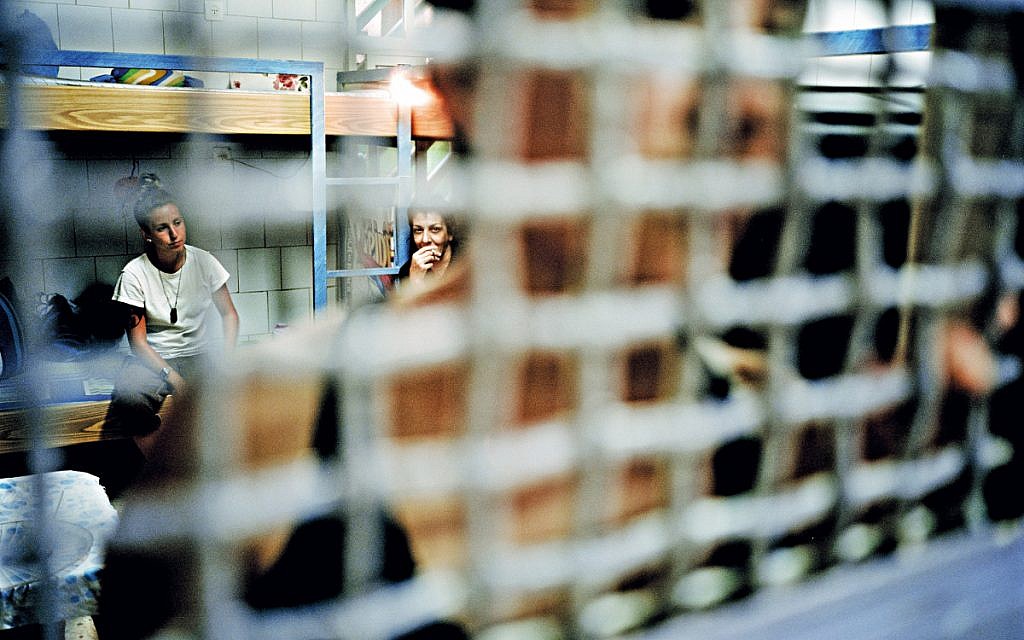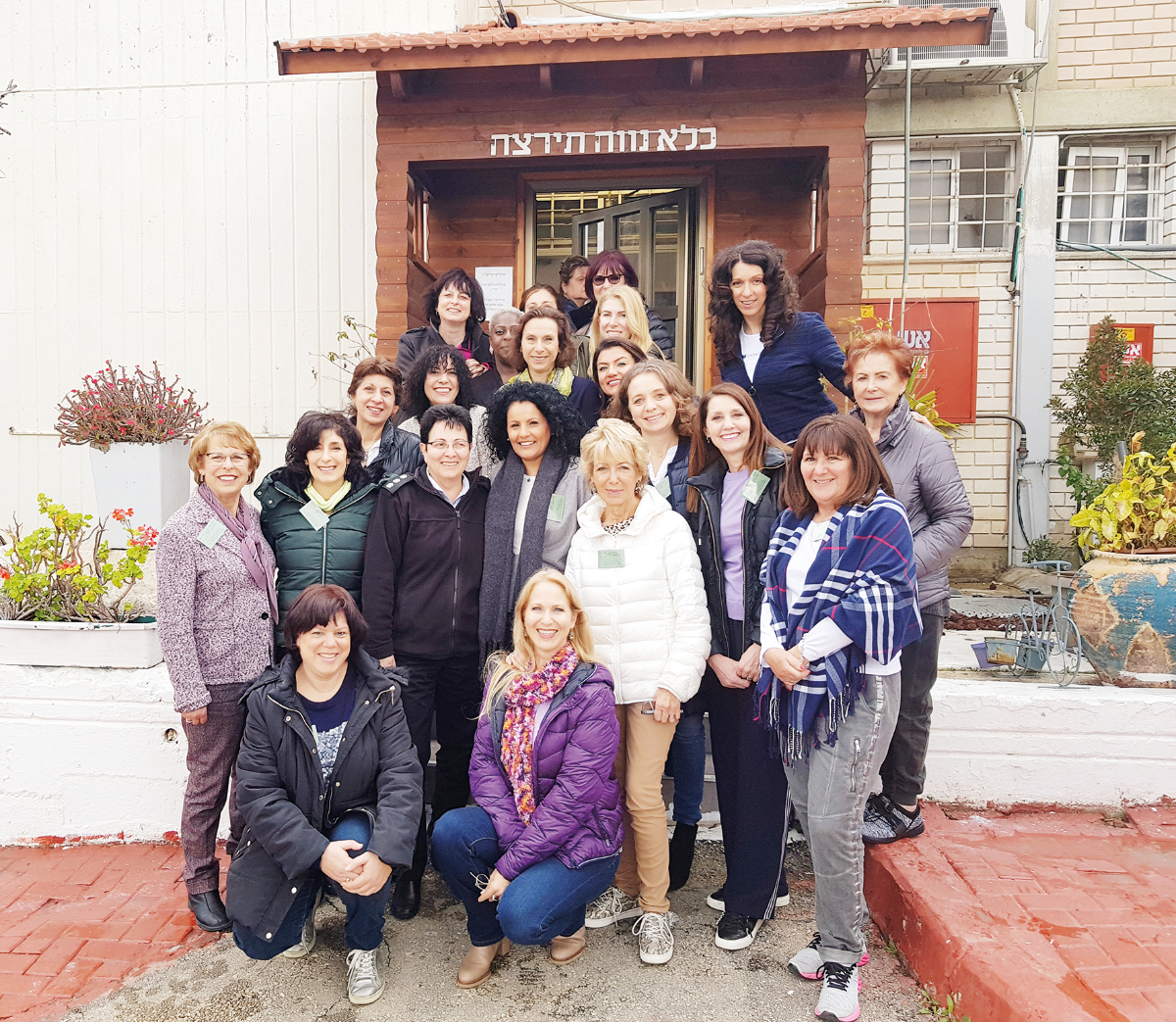Behind the bars in Israel’s only female prison
Jewish News joins WIZO touring the Neve Tirza prison in Ramla, which is home to all of Israel's 200 women convicts - and children.

There are more than 25,000 prisoners in Israel. Just 200 of those are female and they’re all housed together in Neve Tirza, the country’s only female prison in Ramla, near Tel Aviv.
I’m visiting Neve Tirza during WIZO UK’s Chairwoman’s mission (discovery trip) to Israel. WIZO is the largest social welfare organisation in Israel; while it doesn’t fund this prison, we’re here to understand the societal context in which it operates.
I’m at the prison on our first morning in Israel. It’s a sobering start to my time here. The building, cream-coloured and boxy on the outside, hasn’t been touched since it was opened in 1968. It’s in desperate need of repair throughout.
Get The Jewish News Daily Edition by email and never miss our top stories Free Sign Up
Each small cell houses up to six women, who sleep on metal bunk beds and share a rusty shower. There’s just enough room to exist and I wonder how the women cope with such a lack of personal space. As we quietly tour the facility, a thin inmate grabs the bars of her cell and stares at us. I do my best to avoid eye contact.
I’m surprised by a mum and baby cell, complete with a pink cot and hand-painted Minnie and Mickey on the wall. The mum and baby share a room with two other prisoners as inmates can earn better cells with good behaviour. As a mum to a noisy toddler, I wonder what the two women did to end up sharing with somebody else’s baby.
Sara Friedman has been head warden at Neve Tirza for 12 years, having started here 30 years ago as a teacher. Describing her job as “the most interesting one I’ve had”, she’s calm yet formidable. There’s a wide age range of prisoners: from 14 to 70.
The youngest ones live in separate cells so that they’re not encouraged further into crime by the older ones, although Friedman says the prisoners take a different tack anyway: “When the younger ones come in, the women are protective and motherly. They tell them not to make the same mistakes they did.”
She explains that the staff also have a nurturing job to do. They help the prisoners to keep in touch with their families.
“When a woman comes here, her family falls apart. The kids are sent to boarding school, the husband abandons her. We arrange regular visits and a mother and child programme with a monthly kids’ day. There’s a petting zoo here and other activities for the mums and kids to bring them together.”
A busy programme of work and other activities for the women “shows them there’s a life outside of crime,” says Friedman. They’re employed in manual labour by Israel Prison Industries, an organisation that works with Israel’s businesses to give prisoners a skill and nominal wages. Kashi Nissim, its manager, says: “When people have a job and a salary, they have a better chance of correction. These are human beings who’ve made mistakes. We have the opportunity to help them to go outside and make a better life.”
On top of work, there’s professional training, from hairdressing to flower arranging, a theatre group and classes in reading, writing and high school matriculation. How do the women fit all of this in? “They multitask!” exclaims Friedman.

The prison’s busy rehabilitation programme is largely successful. Many women leave prison having worked proper jobs and learned new skills. Yet the reoffending rate is a notable 40 percent.
Friedman explains the challenge of prisoners who want to come back to prison. “Ninety percent of the women here were assaulted in their past. They were the victims in their family, their families were never safe. For some, this is their home.”
So desperate was one prisoner to return that she assaulted Friedman to get charged. “It was midnight and I was jumped on as I got into my car. Somebody started punching me, there was a struggle and a guard came to help. The attacker turned out to be an ex-prisoner who wanted to commit a crime so she could come back inside for a hot meal and a shower. In the end, she got what she wanted. She’s still in prison. That’s just one example of what happens when there’s nobody to take in these women.”
For some prisoners, it may be too late to create a better future. That’s why WIZO believes the key is in prevention. As Ronit Ribak Madari, chair of WIZO UK, says: “We do social integration work because we want to ensure that young women leave vocational school with something they can do. When we change lives, we can build futures.”

Thank you for helping to make Jewish News the leading source of news and opinion for the UK Jewish community. Today we're asking for your invaluable help to continue putting our community first in everything we do.
For as little as £5 a month you can help sustain the vital work we do in celebrating and standing up for Jewish life in Britain.
Jewish News holds our community together and keeps us connected. Like a synagogue, it’s where people turn to feel part of something bigger. It also proudly shows the rest of Britain the vibrancy and rich culture of modern Jewish life.
You can make a quick and easy one-off or monthly contribution of £5, £10, £20 or any other sum you’re comfortable with.
100% of your donation will help us continue celebrating our community, in all its dynamic diversity...
Engaging
Being a community platform means so much more than producing a newspaper and website. One of our proudest roles is media partnering with our invaluable charities to amplify the outstanding work they do to help us all.
Celebrating
There’s no shortage of oys in the world but Jewish News takes every opportunity to celebrate the joys too, through projects like Night of Heroes, 40 Under 40 and other compelling countdowns that make the community kvell with pride.
Pioneering
In the first collaboration between media outlets from different faiths, Jewish News worked with British Muslim TV and Church Times to produce a list of young activists leading the way on interfaith understanding.
Campaigning
Royal Mail issued a stamp honouring Holocaust hero Sir Nicholas Winton after a Jewish News campaign attracted more than 100,000 backers. Jewish Newsalso produces special editions of the paper highlighting pressing issues including mental health and Holocaust remembrance.
Easy access
In an age when news is readily accessible, Jewish News provides high-quality content free online and offline, removing any financial barriers to connecting people.
Voice of our community to wider society
The Jewish News team regularly appears on TV, radio and on the pages of the national press to comment on stories about the Jewish community. Easy access to the paper on the streets of London also means Jewish News provides an invaluable window into the community for the country at large.
We hope you agree all this is worth preserving.
-
By Brigit Grant
-
By Laurent Vaughan - Senior Associate (Bishop & Sewell Solicitors)
-
By Laurent Vaughan - Senior Associate (Bishop & Sewell Solicitors)
-
By Laurent Vaughan - Senior Associate (Bishop & Sewell Solicitors)
-
By Laurent Vaughan - Senior Associate (Bishop & Sewell Solicitors)





















